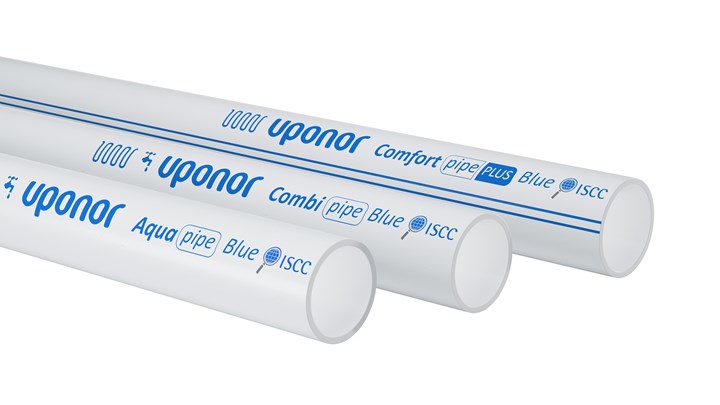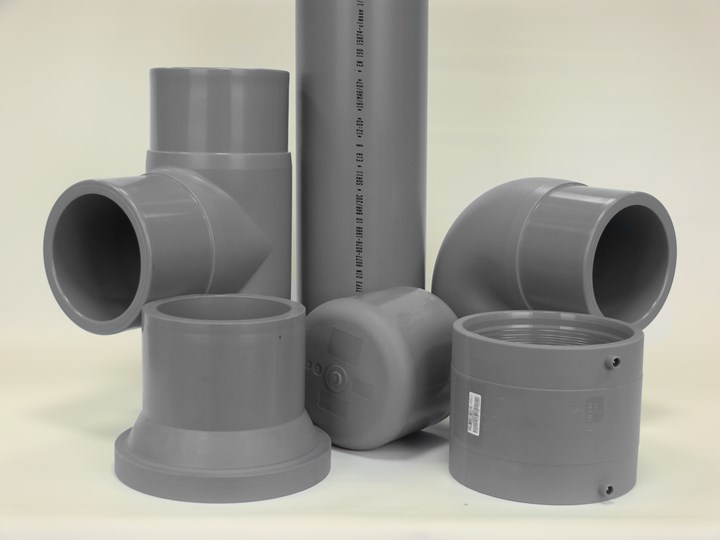Borealis and Partners Move Forward with Crosslinked PE and PP Pipes Based on Renewable Feedstock
The company’s partnerships in these new drop-in solutions significantly advances carbon footprint reduction.

The sustainability ‘movement’ in the plastics industry continues to advance and materials and additives suppliers are among the leaders, largely through innovative industry partnerships, in this overall endeavor—ranging from mechanical and chemical recycling advancements to biobased feedstocks and materials. And, while single-use plastics has been the chief focus, this movement has been growing way beyond.
One example is advancing renewable feedstock in the polyolefins pipe markets and the is among one of the strongest participants in this arena with its industry partnerships. Says John Webster, Borealis’ global commercial director for infrastructure, “The use of certified renewable polymers is considered an instrumental lever to accelerate the transition from a linear to a circular plastics economy. It mitigates fossil depletion, helps all pipes & fittings value chain players reach their sustainability targets faster and supports the industry’s aims to become carbon-neutral. Together with our pipe industry partners, we are committed to reinventing the plastics system for more sustainable living.”
Take a look at these drop-in replacements for crosslinked PE and PP pipes made from Borealis’ Bornewables portfolio of polyolefins based on second-generation natural resources, such as waste from pulp production or residues from food processing oils. Based on a mass balance accounting process under the International Sustainability & Carbon Certification Plus (ISCC Plus) scheme, the accreditation of these materials allows Borealis and its partners to prove and quantify the effective renewable content at each manufacturing step from the Bornewables material to the final pipe. Both efforts are aligned with Borealis’ EverMinds activities and initiatives to advance the circularity of plastics through partnerships across the value chain.
â–ª Crosslinked PE for HVAC
Borealis’ Bornewables PEX was used by pipe specialist Upanor, Apple Valley, Minn., to create the PEX Pipe Blue, which is said to be the world’s first pipe portfolio made from PEX with renewable feedstock, accredited by the ISCC Plus scheme.
The new PEX Pipe Blue products boast an unprecedented carbon footprint reduction of up to 90% when compared to conventional fossil-based PEX pipes. This also marks a major step forward to help customers in the building and construction industry achieve their sustainability targets in plumbing, heating, ventilation and air-conditioning (HVAC) installations.

&²Ô²ú²õ±è;â–ª&²Ô²ú²õ±è; PP Pipes for Residential Plumbing, Heating & HVAC
Borealis partnered with Italy’s NUPI (Houston-based NUPI North America) for high-performance pipes based on the Bornewables ISCC Plus-Certified renewable feedstock. Nupi Industrie Italiane (NUPI) is the first pipe supplier in Italy to use Bornewables in high-performance random copolymer PP pipes for plumbing and heating systems. The company has selected the Bornewables PP for the next generation of their Niron Beta PP-RCT (Polypropylene Random Crystalline Structure Temperature) piping solutions for domestic plumbing, heating as well as heating, ventilation, and air conditioning (HVAC) systems designed to perform under higher stress conditions and temperatures.
Bornewables PP reportedly offers the same material performance as virgin PP. The partnership positions NUPI as a front-runner in the market, getting ready for the time when legislation will require the use of renewable materials in pipe production, and makes the company the first pipe supplier in Italy relying on mass balanced Bornewables PP accredited under the ISCC Plus scheme.
Going renewable with advanced material technology PP-RCT, as defined by ASTM F2389 and EN ISO 15874, refers to a chemistry of ‘Polypropylene Random Copolymers with modified Crystallinity and Temperature’ resistance. As a drop-in replacement of fossil-based virgin PP, it eliminates the need for NUPI and end-users to seek renewed approval from water regulation authorities.
Said NUPI Group’s QC director Roberta Brusi, “By adopting the Bornewables PP from Borealis for our new PP-RCT pipes, we are taking a major step forward in our efforts to reduce the carbon footprint of our products and stay ahead of more stringent regulations by which the use of renewable feedstock may soon become mandatory for plastic pipes. The ISCC Plus certification of the material also helps us document the renewable content in our PP-RCT formulation and pipes in a clearly traceable way.”
Related Content
Part 3: The World of Molding Thermosets
Thermosets were the prevalent material in the early history of plastics, but were soon overtaken by thermoplastics in injection molding applications.
Read MorePolymer Science for Those Who Work With Plastic — Part 1: The Repeat Unit
What are the basic building blocks of plastics and how do they affect the processing of that material and its potential applications in the real world? Meet the repeat unit.
Read MorePolymer Showdown — PC/ABS vs. PC/PBT — May the Best Material Win
First in a series, experts from plastics engineering consultancy The Madison Group will pit leading thermoplastics against each other to see how they differ in processing characteristics, chemical resistance, thermal and mechanical performance, and more.
Read MorePolymer Science for Those Who Work With Plastics: Molecular Weight — What It Is and Why It Matters
Molecular weight might seem like an abstract concept, but it plays a crucial role in determining the behavior of plastics during processing and in their final applications.
Read MoreRead Next
Lead the Conversation, Change the Conversation
Coverage of single-use plastics can be both misleading and demoralizing. Here are 10 tips for changing the perception of the plastics industry at your company and in your community.
Read MoreFor PLASTICS' CEO Seaholm, NPE to Shine Light on Sustainability Successes
With advocacy, communication and sustainability as three main pillars, Seaholm leads a trade association to NPE that ‘is more active today than we have ever been.’
Read MoreMaking the Circular Economy a Reality
Driven by brand owner demands and new worldwide legislation, the entire supply chain is working toward the shift to circularity, with some evidence the circular economy has already begun.
Read More














